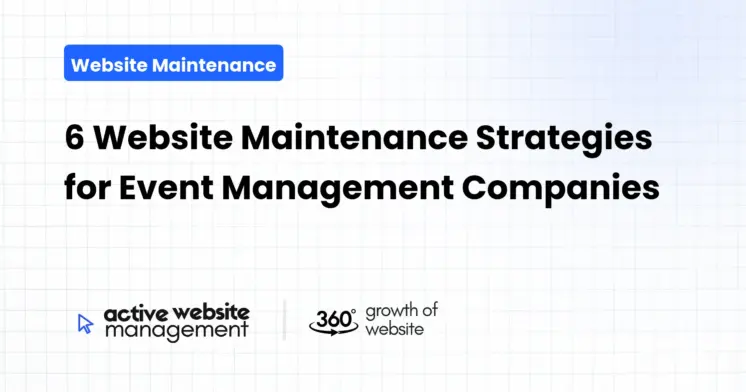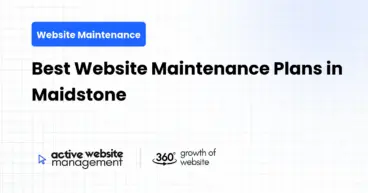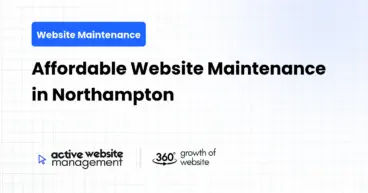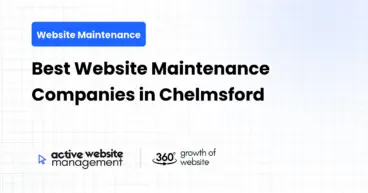January 23, 2025
13 min read
Your website is the digital storefront for your event management company. It’s often the first impression you make on potential clients, a place where they gauge your professionalism, creativity, and ability to deliver exceptional experiences. Just like a physical venue requires regular upkeep, your website needs consistent maintenance to stay relevant, functional, and effective. Ignoring this crucial aspect can lead to lost leads, frustrated clients, and ultimately, a damaged reputation.
This article delves into six essential website maintenance strategies tailored specifically for event management companies. We’ll explore why each is critical, how to implement them, and what benefits they offer to ensure your online presence is a powerful tool in your success. Think of this not as a chore, but as an investment in the long-term health and growth of your business.
1. Regular Content Updates: Keeping Your Site Fresh and Relevant
Why Fresh Content Matters
Imagine walking into a store where the displays haven’t changed in years, the same old items are on the shelves, and nothing feels exciting or new. Would you be inclined to spend your money there? Your website is no different. Stale content sends a message that your business is inactive, uninspired, or out of touch with current trends.
For event management, specifically, fresh content demonstrates your ongoing success, creativity, and expertise. It shows you’re actively planning events, not just relying on past glories. This consistent activity builds trust and encourages potential clients to see you as a dynamic and reliable partner. Search engines also prioritize websites that are regularly updated, improving your chances of ranking higher in relevant search results. This is critical to ensure people seeking event planners find your site.
How to Implement Content Updates
- Blog Posts: Regularly publish blog posts about event trends, planning tips, case studies of successful events, and behind-the-scenes glimpses of your team in action. Target keywords like “event planning checklist,” “corporate event ideas,” or “wedding venue selection” to attract traffic from specific search queries. This also helps you address user questions around the whole event planning process.
- Portfolio Showcase: Continuously update your portfolio with photos and details of your recent events. High-quality images and videos showcasing your creativity and ability to execute various event types are crucial. Include client testimonials to add social proof and build trust. This is a goldmine for showcasing your event planner expertise.
- Team Profiles: Keep your team profiles current with new certifications, awards, and updated roles. Humanizing your brand makes your company more approachable and relatable. Potential clients often want to know who they are working with.
- Service Updates: If you add new services or modify existing offerings, ensure your website reflects these changes accurately. Keeping your services page current is a must.
- Seasonal Content: Adjust your website content to reflect specific holidays or seasons. You could offer themed event packages or create blog posts discussing appropriate event decor and themes.
- Press Releases & Announcements: Post news of your latest achievements, partnerships, and awards on your news page.
- Utilize Content Calendar: Creating a content calendar can help you streamline the content creation process. It allows you to schedule posts in advance, plan your topics, and track progress.
Don’t Just Maintain Your Website—
Grow It using Active Website Management! Don't Wait for Growth—Accelerate It with Active Website Management
Benefits of Consistent Content
- Improved SEO: Fresh content signals to search engines that your site is active, boosting your search rankings.
- Increased Engagement: New and relevant content keeps visitors on your site for longer, lowering your bounce rate and improving your chances of conversions.
- Enhanced Brand Image: Regular updates showcase your expertise, creativity, and responsiveness to industry trends.
- Lead Generation: Informative and engaging content can attract new visitors and help you capture more leads.
2. Regular Technical Maintenance: Ensuring Website Functionality and Security
Why Technical Maintenance is Non-Negotiable
Imagine if your event venue’s sound system or lighting failed during a crucial presentation. It would be disastrous! The same is true for your website. If your site is slow, riddled with errors, or vulnerable to security threats, it will drive away potential clients and damage your reputation. Technical maintenance ensures that your site is functioning optimally, creating a seamless experience for visitors and protecting your business from costly security breaches. This helps to maintain a positive brand image.
How to Implement Technical Maintenance
- Software Updates: Regularly update your website’s content management system (CMS), plugins, and themes. These updates often include crucial security patches and performance improvements. Consider implementing a schedule for these updates.
- Website Backups: Implement a reliable backup system to ensure you can quickly restore your website in case of a crash or security breach. Backups should be done at least weekly, or even daily if you have frequent website changes.
- Website Speed Optimization: Optimize your website’s loading speed by compressing images, minifying code, and utilizing a content delivery network (CDN). Google prioritizes fast-loading websites.
- Broken Link Checks: Regularly scan your website for broken links and fix them. Broken links create a poor user experience and negatively impact your SEO.
- Website Security Audits: Conduct regular security audits to identify and fix any vulnerabilities. Invest in SSL certificates and strong passwords. Website security is paramount to keep sensitive data safe.
- Mobile Optimization: Ensure your website is fully responsive and works well on all devices, including smartphones and tablets. This is a must for modern websites.
- Server Monitoring: If you host your website on your own server, ensure you’re monitoring it for performance issues and security threats.
Benefits of Regular Technical Maintenance
- Improved Performance: Ensures your website loads quickly and runs smoothly, enhancing user experience.
- Enhanced Security: Protects your website from malware, hacking attempts, and data breaches.
- Reduced Downtime: Minimizes the risk of website crashes and downtime, keeping your site accessible to visitors.
- Better User Experience: Provides a smooth and user-friendly browsing experience, encouraging conversions.
- Improved SEO: Search engines favor well-maintained websites, improving your search rankings.
3. Search Engine Optimization (SEO): Increasing Visibility and Attracting Organic Traffic
Why SEO is Essential for Event Management Companies
Imagine having a beautifully designed event brochure, but nobody sees it. That’s what it’s like to have a website without SEO. Search Engine Optimization is the process of optimizing your website to rank higher in search engine results pages (SERPs). This ensures potential clients searching for event planning services online find your website first. Increased visibility leads to more traffic, more leads, and more business. For event planners, this is how clients can find you.
How to Implement SEO Strategies
- Keyword Research: Identify relevant keywords that potential clients are using when searching for event management services (e.g., “corporate event planner [city name],” “wedding planner [style of wedding],” “conference planning services”). Use tools like Google Keyword Planner and Ahrefs to research keywords.
- On-Page Optimization: Optimize your website pages with target keywords in page titles, headings, meta descriptions, and content. Make sure the content flows naturally and is easy to read.
- Off-Page Optimization: Build high-quality backlinks from other reputable websites. Participate in guest blogging, online directories, and industry forums.
- Local SEO: Optimize your Google My Business profile and claim listings on relevant local business directories. This is crucial for attracting local clients.
- Image Optimization: Compress images, use descriptive alt text, and ensure that images are mobile-friendly.
- Internal Linking: Link to relevant pages within your website, helping search engines understand your website structure and improving user navigation.
- Schema Markup: Implement schema markup to provide search engines with more information about your website, which can improve your visibility in search results.
- Monitor your rankings: Track your website rankings and adjust SEO strategies as needed to optimize for better results.
Benefits of Effective SEO
- Increased Website Traffic: Attracts more organic traffic from search engines, bringing potential clients to your website.
- Higher Search Rankings: Improves your website’s position in search results, increasing visibility and brand awareness.
- Qualified Leads: Attracts targeted leads who are actively searching for event management services.
- Cost-Effective Marketing: Organic traffic is more cost-effective than paid advertising in the long run.
- Improved Brand Credibility: Higher search rankings build trust and credibility with potential clients.
Don't Wait for Growth—Accelerate It with
Active Website Management Don't Wait for Growth—Accelerate It with Active Website Management
4. User Experience (UX) Optimization: Creating a Seamless Journey
Why User Experience Matters
Imagine attending an event where it’s hard to find your way, the signage is confusing, and the overall flow is disorganized. You wouldn’t have a pleasant experience, and you might not attend another event hosted by the same planner. Similarly, a website with poor user experience will frustrate visitors and drive them away. UX optimization focuses on making your website user-friendly, intuitive, and enjoyable to navigate. For event management websites, this is paramount.
How to Implement UX Optimization Strategies
- Intuitive Navigation: Make it easy for visitors to find what they need with clear menus, concise labels, and a logical site structure. This will help your site feel organised.
- Mobile-Friendly Design: Ensure your website is responsive and provides a seamless experience on all devices. This is more important than ever with most searches coming from mobile.
- Clear Call-to-Actions: Make it obvious what you want visitors to do (e.g., “Request a Quote,” “Contact Us,” “Download Brochure”). Use prominent buttons and concise, action-oriented text.
- Fast Loading Speeds: Optimize your website for speed and ensure pages load quickly on all devices.
- High-Quality Visuals: Use professional photos and videos that are optimized for web display.
- Easy-to-Read Content: Write clear, concise, and easy-to-understand content that is scannable. Break up long paragraphs with headings, bullet points, and images.
- Accessibility: Make your website accessible to users with disabilities by using alternative text for images, proper color contrast, and keyboard navigation.
- A/B testing: Test different layouts, colors, and wording to determine what performs best and optimizes your user’s experience.
Benefits of a Great User Experience
- Increased Engagement: Keeps visitors on your website for longer, exploring more pages.
- Lower Bounce Rate: Reduces the number of visitors who leave your site after viewing only one page.
- Higher Conversion Rates: Encourages visitors to take action, such as contacting you for a quote or booking a consultation.
- Improved Brand Perception: A well-designed and user-friendly website enhances your brand image.
- Increased Customer Satisfaction: Makes the entire experience more enjoyable for potential clients.
Imagine driving without a speedometer or fuel gauge. You wouldn’t know how fast you’re going or how much fuel you have left. Similarly, neglecting website performance monitoring is like operating your business blindfolded. You need to track key metrics to understand what’s working, what’s not, and where to make improvements. This allows you to make data-driven decisions and continuously refine your website and your approach. Understanding these numbers is vital for event planning businesses.
- Google Analytics: Set up Google Analytics to track website traffic, user behavior, bounce rates, and conversion rates.
- Conversion Tracking: Track the specific actions you want visitors to take (e.g., contact form submissions, quote requests).
- Heatmaps: Use heatmap tools to see where users are clicking and scrolling on your website.
- A/B Testing: Experiment with different website elements to see what performs best.
- SEO Tracking Tools: Use tools like SEMrush, Moz, and Ahrefs to track your search rankings and identify areas for improvement.
- Regular Reporting: Create regular reports to analyze website performance and identify trends.
- Implement changes based on data: Once you have the data, implement changes to optimize the website.
- Identify Areas for Improvement: Uncover weak areas of your website that need attention.
- Optimize for Conversions: Make data-driven decisions to improve conversion rates.
- Track ROI: Measure the return on investment of your website and marketing efforts.
- Understand User Behavior: Gain insights into how users interact with your website.
- Refine SEO Strategies: Adjust your SEO strategy based on keyword performance and search rankings.
6. Active Website Management: Ensuring Continuous Improvement
Why Active Website Management is Necessary
Maintaining a website is not a one-time task; it’s an ongoing process. It requires consistent effort, proactive monitoring, and a commitment to continuous improvement. Active website management is about being vigilant, making necessary changes, and adapting to the evolving digital landscape. This is very important for a successful event management business.
How Active Website Management Can Help
- Regular Updates & Maintenance: Ensures that the website is regularly updated, performs well, and that any issues are quickly addressed. This process keeps the site healthy.
- Security Monitoring: Constant checks on security protocols to prevent breaches, keep data safe, and maintain the integrity of the website.
- Performance Optimisation: Continuous monitoring and optimization of website speed, responsiveness, and overall performance to improve user experience and SEO.
- Content Management: Regular review and updates to website content to ensure that it is relevant, engaging, and optimized for search engines.
- SEO Improvement: Consistent review and optimization of SEO parameters for better search engine rankings, increased website traffic, and more qualified leads.
- User Experience Improvement: Regular review and testing to optimize user experience, improve engagement, and increase conversions.
How Active Website Management by Active Website Management Can Help
Active Website Management offers comprehensive website maintenance services tailored to event management companies. Their team of experts ensures your website is always up-to-date, secure, and optimized for performance. With Active Website Management, you can focus on what you do best – planning and executing exceptional events – while they handle the technical aspects of your online presence. Here’s how Active Website Management can assist:
- Proactive Maintenance: Regular software updates, backups, and security checks to keep your website running smoothly.
- Technical Support: Dedicated support team to address any issues quickly and efficiently.
- SEO Optimization: Experts in SEO to ensure your website ranks highly in search results.
- Content Updates: Professional content creation and management to keep your website fresh and relevant.
- Performance Monitoring: Continuous monitoring and analysis to track results and make data-driven decisions.
- User Experience Optimization: Ongoing testing and refinement to ensure your website provides a great user experience.
- Website Security: Implementation and monitoring of security protocols to protect your website from threats.
- Peace of Mind: Focus on your core business knowing that your website is in safe hands.
Benefits of Active Website Management
- Professional Website: Ensure your website projects a professional image, reflecting the high-quality events you plan.
- Reduced Downtime: Minimize the risk of website crashes and downtime, keeping your site accessible to clients.
- Improved ROI: Increase your website’s ROI by optimizing it for conversions and lead generation.
- Focus on Core Business: Free up your time and resources to focus on your strengths and areas that will directly increase business.
- Expertise and Knowledge: Access to a team of experts with extensive knowledge in website management and online marketing.
Conclusion
Your website is your most valuable digital asset, and keeping it in top shape is essential for your event management company’s success. By implementing these six website maintenance strategies, you can create a powerful online presence that attracts clients, generates leads, and drives growth. Remember that this is an ongoing commitment, not a one-time project, and active management is crucial to keeping your site ahead of the competition.







